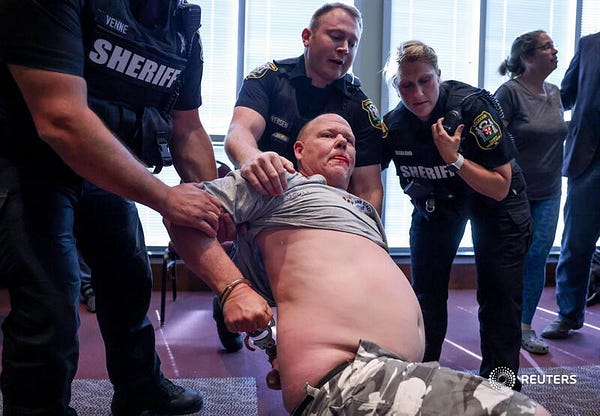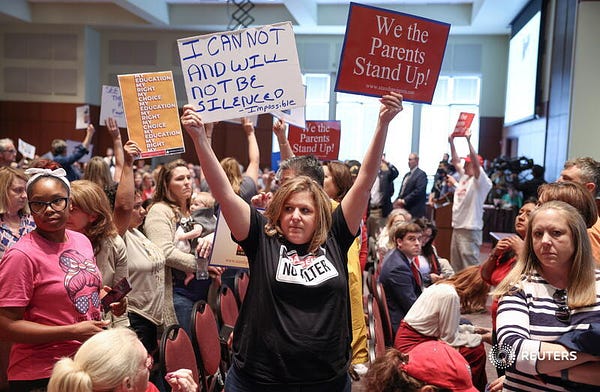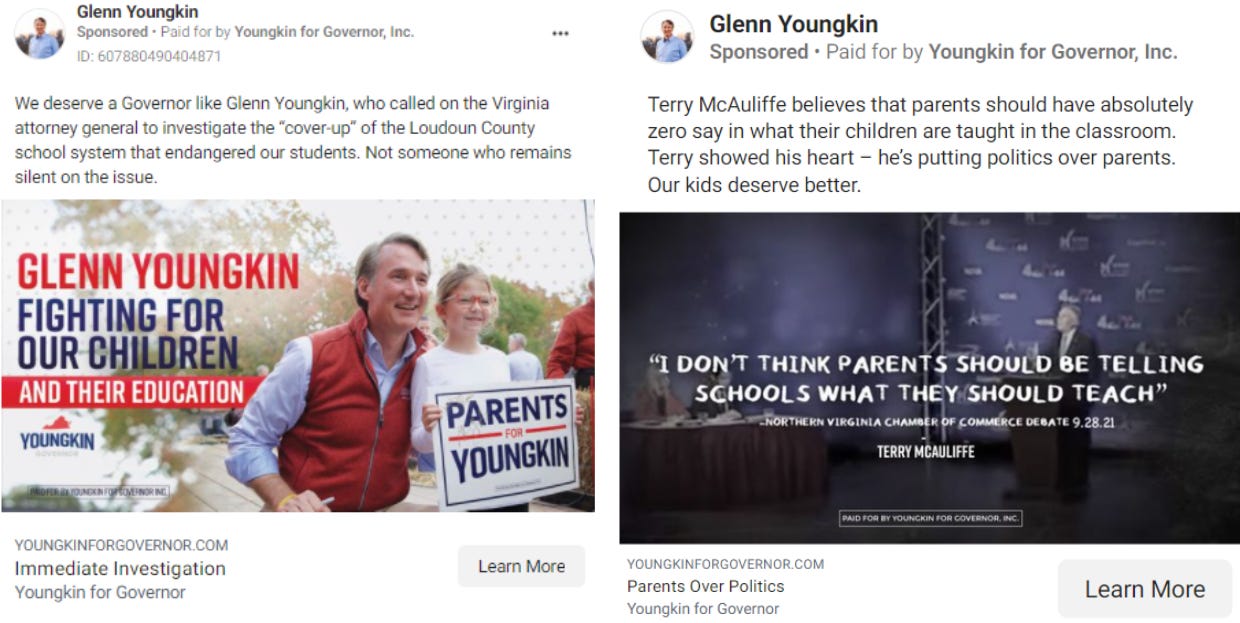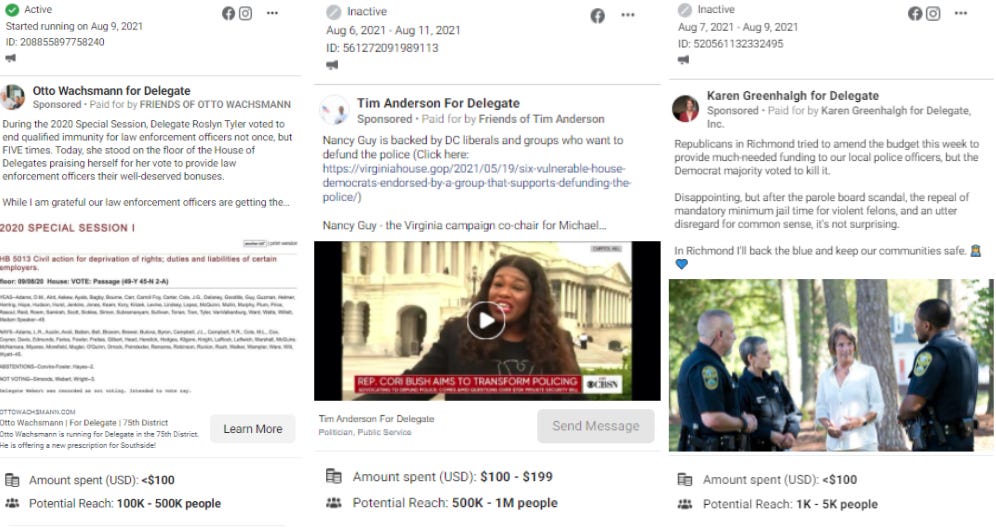Not the results we were looking for...
Democrats’ smart campaigns & tactics couldn’t overcome deeper issues with the electorate
Welcome to the final edition of FWIW Virginia, where for the past six months, we’ve analyzed digital spending trends on both sides of the aisle in the 2021 Virginia statewide and legislative elections. To continue receiving emails like this from us, subscribe to our national newsletter, FWIW, here.
It was a tough night in Virginia Tuesday.
You’ve already heard the story - Glenn Youngkin became the first Republican to win a statewide election in Virginia since 2009, and along with his victory came a clean sweep of the commonwealth’s statewide offices, and an apparent 2 seat majority in the House of Delegates. In a state carried by Joe Biden by 10 points just one year earlier, it’s a genuinely shocking result that caught many off guard.
As we noted throughout the election, Youngkin had a difficult tightrope to walk in order to win statewide. He had to both turnout his rural, whiter GOP base and persuade suburban voters to abandon the Democratic Party they had fled to during the Trump Presidency. It appears Youngkin did both of those things, with consistent shifts to the right across the entire state.

The result may be larger than just Virginia - up the east coast, a Democratic collapse in New Jersey led to a much narrower than expected re-election for Gov. Phil Murphy. While there are already WAY too many takes out there to validate anyone’s opinion of what went wrong, there were also a few digital trends we picked up on that appear to have impacted Tuesday’s result.
It wasn’t about a spending advantage
We can comfortably say that Democrats outspent Republicans on digital advertising at nearly every level. On TV, McAullife outspent Youngkin too by a smaller margin. As of October 31st, McAuliffe’s campaign had outspent Youngkin’s campaign on Facebook and Google ads by over $4.2 million during the general election.
Looking at the other down-ballot statewide races, Hala Ayala had the digital ad space entirely to herself, spending $273,027 on Facebook + Google to Sears’ $0 in digital spending. In the race for Attorney General, the closest of all the statewide races, incumbent AG Mark Herring outspent GOP nominee Jason Miyares by over 5-to-1. In fact, Miyares went up with introductory biographical ads just weeks before the election.
Democrats had the advantage on paid digital media, but it appears that their message simply didn’t break through with voters enough to overcome an apparently poor national environment.
Who nationalized the race?
Heading into 2021, Terry McAuliffe’s team had seemingly every incentive to nationalize the election. Donald Trump was toxic in Virginia, losing the state twice and powering massive Democratic gains in 2017 and 2019, including their first trifecta since 1993. Less than one year ago, his supporters led a coup attempt on the U.S. Capitol - just a few miles down the road from Virginia’s swingy suburbs.
We saw that trend clearly in the ads run by each candidate, which we broke down in our October 21st issue.
Of the ~8,780 Facebook ads ran by Terry McAuliffe through October 21…
~3,140 (35%) mentioned Youngkin
~2,240 (25.5%) mentioned Trump
~405 (4.6%) mentioned Joe Biden
And of the ~1,700 Facebook ads run by Glenn Youngkin through October 21…
~450 (26%) mentioned McAuliffe
~48 (2.8%) mentioned Trump
Only 1, from the GOP nomination contest, mentioned Joe Biden
McAuliffe’s team spent much of the race tying Glenn Youngkin to Donald Trump, running ads like this, which first aired on YouTube in July and was run as late as October 31st.
Nationalization is great until the national environment turns against you. After going all-in on a negative, nationalized message, the national environment turned against McAuliffe down the stretch. On Election Day, Biden’s approval rating in FiveThirtyEight’s polling aggregate sunk to its all-time low of 42.9%, and despite doing everything possible to tie Youngkin to Trump, it doesn’t appear that the attack stuck.
We watched the McAullife campaign run a tactically strong campaign - innovative voter outreach across multiple platforms, fundraising, advertising, organizing, surrogates, earned media, the works - but those things just couldn’t overcome a deeper narrative issue.
Culture wars could’ve boosted Youngkin
The Virginia GOP was burnt by culture war issues during the Trump era, as 2017 GOP nominee Ed Gillespie’s infamous MS-13 attack ads fizzled out in the closing weeks of the race. It’s possible that those culture war issues just invoked Trump while he was still in office, but Youngkin appears to have been an effective messenger of those issues.
Discussion over “Critical Race Theory” began to dominate conservative media over the summer, and we dedicated an entire issue on July 1st on how the Virginia GOP was weaponizing the issue to fire up their base. The issue led to raucous school board meetings in Northern Virginia in late-June, and Google search interest on the term spiked around the same time.




Youngkin’s campaign jumped on the CRT bandwagon in June, reframing it as “school boards undermining their children’s education” and as liberals shutting parents out of their children’s education.
While Trump favored a brasher approach to culture war issues that failed in Virginia (despite their success in other parts of the country), Youngkin’s repackaged version of the culture war appears to have broken through.
Most know by now that McAuliffe made a brutal gaffe at the September Chamber of Commerce debate that played directly into Youngkin’s line of attack, claiming that “I don’t think parents should be telling schools what they should teach.” It’s a line that Youngkin bashed McAuliffe with tens of thousands spent on digital ads (and much more on TV) throughout October as his campaign pivoted hard into messaging on education.
Dogwhistle attacks on public safety showed up consistently in GOP messaging as well, with the Virginia GOP breaking out the “Tough on Crime” playbook from the 80s and 90s. Back when we covered the issue in August, we found ads from Republican delegate candidates attacking Democratic incumbents over “defunding the police” and qualified immunity. Notably, all three of the challengers whose ads we featured defeated Democratic incumbents on Tuesday night in some of the key seats the GOP needed to win back the House majority.
As the 2021 elections close and all eyes turn to the impending 2022 midterms, we expect the GOP to look closely at their Virginia playbook as they look to claw back the slim House and Senate majorities held by Congressional Democrats. These culture-war attacks aren’t going away, and it’s clear that tying Republicans to Trump in the suburbs isn’t enough to keep those voters in the Democratic coalition. With so much on the line in 2022, it’s up to Democrats to figure out how to neutralize those attacks and counter the Republican media network that disseminates them.
Wrapping up
That’s it for FWIW Virginia this cycle! We wanted to thank you again for sticking with us and being a part of this community every week. We’re especially grateful for those of you in the arena, who poured your hearts into campaigns to make Virginia a better place. We were so impressed watching all of your strategies unfold every week, and we hope some of the data we provided helped your teams out.
If you’re interested in digging deeper with other FWIW newsletters, you can subscribe to Campaigner, a new newsletter on campaign tactics, or FWIW National, on digital political trends nationwide.
See you in 2023?








